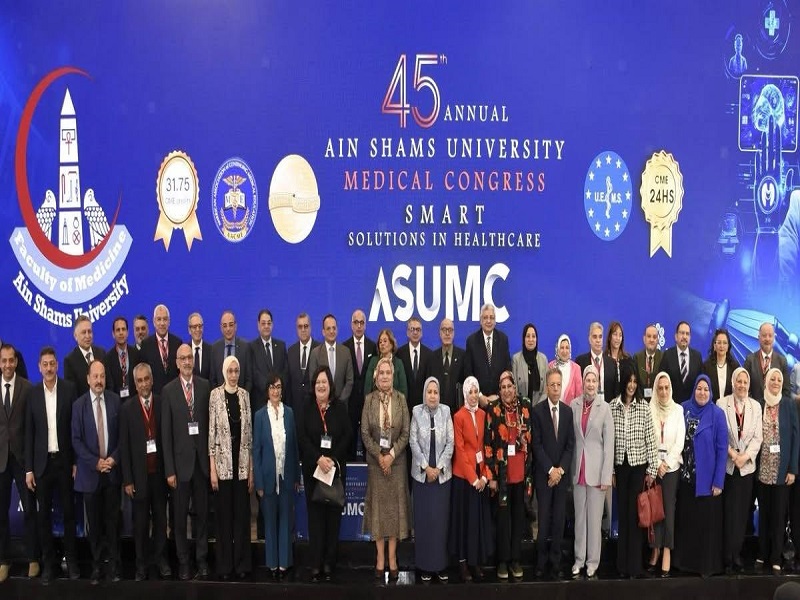The Presidential Advisor for Health and Prevention and the President of Ain Shams University inaugurate the 45th Annual Conference of the Faculty of Medicine
Dr. Awad Tag El-Din: Egyptian doctors were among the first to introduce artificial intelligence to the field of radiology... and medicine will remain a profession of humans before machines.
* Dr. Mohamed Diaa: The strength of faculties is measured by their influence, not their history... and artificial intelligence is a supportive tool, not a substitute for doctors.
* Dr. Ali Al-Anwar: Artificial intelligence is used to guide doctors... and we have already begun implementing smart curricula in medical education.
The 45th Annual Conference of the Faculty of Medicine, at Ain Shams University, was launched in the presence of Prof. Awad Tag El-Din, Advisor to the President of the Republic for Health and Prevention; Prof. Mohamed Diaa Zain El-Abedeen, President of Ain Shams University; Prof. Osama Abdel-Hay, Head of the Doctors Syndicate; Prof. Ghada Farouk, Vice President for Community Service and Environmental Development; Prof. Ali Al-Anwar, Dean of the Faculty of Medicine and Chairman of the Board of Directors of University Hospitals;
Prof. Tarek Youssef, Executive Director of University Hospitals; Prof. Hala Sweid, Vice Dean for Community Service and Environmental Development; Prof. Rania Salah, Vice Dean for Education and Student Affairs; Prof. Tarek Ahmed Youssef, Acting Vice Dean for Graduate Studies and Research; Prof. El-Zaher Hassan El-Zaher, Head of the Department of Orthopedics and Conference Chair; and a host of department heads and faculty staff.
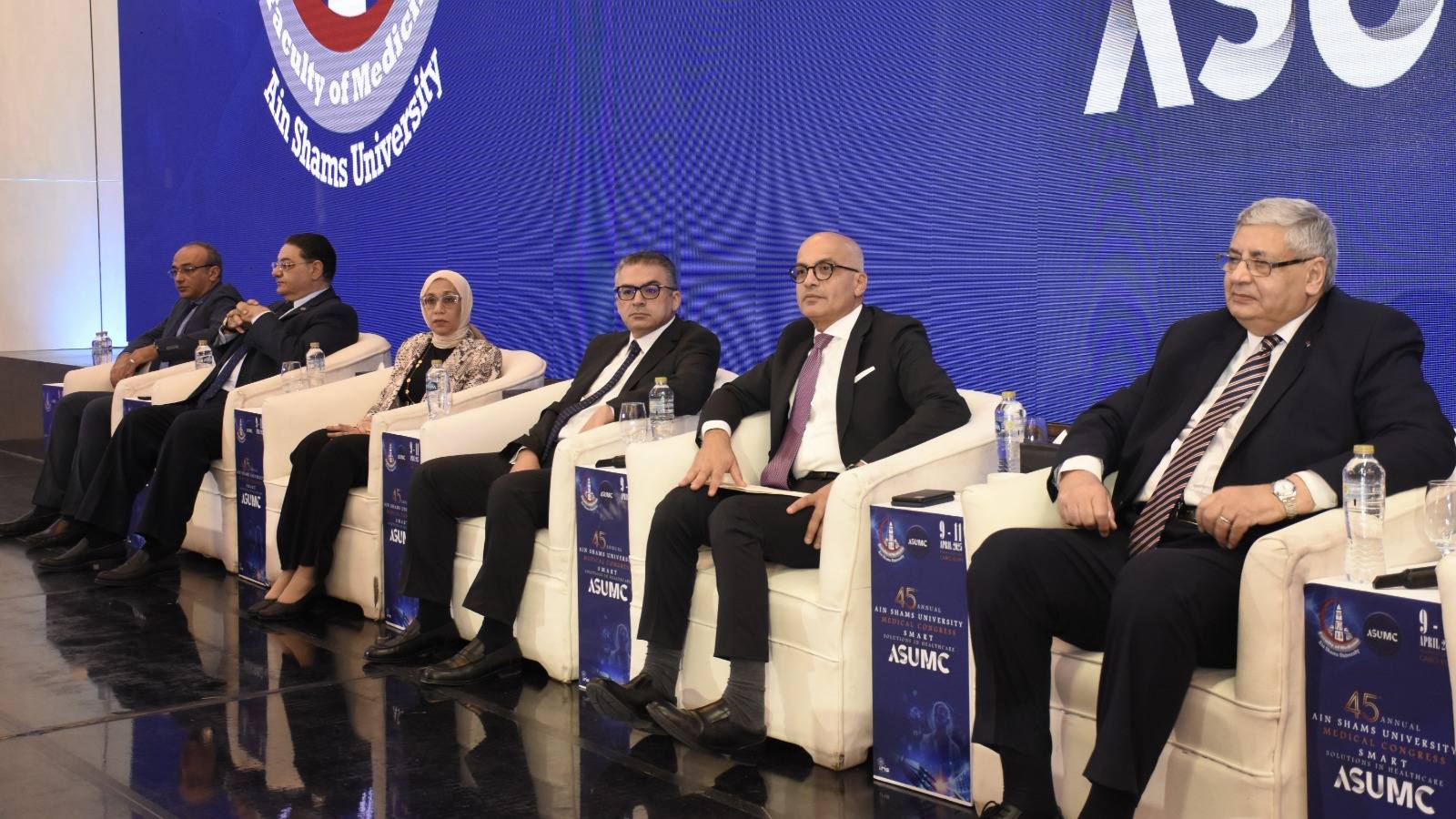 |
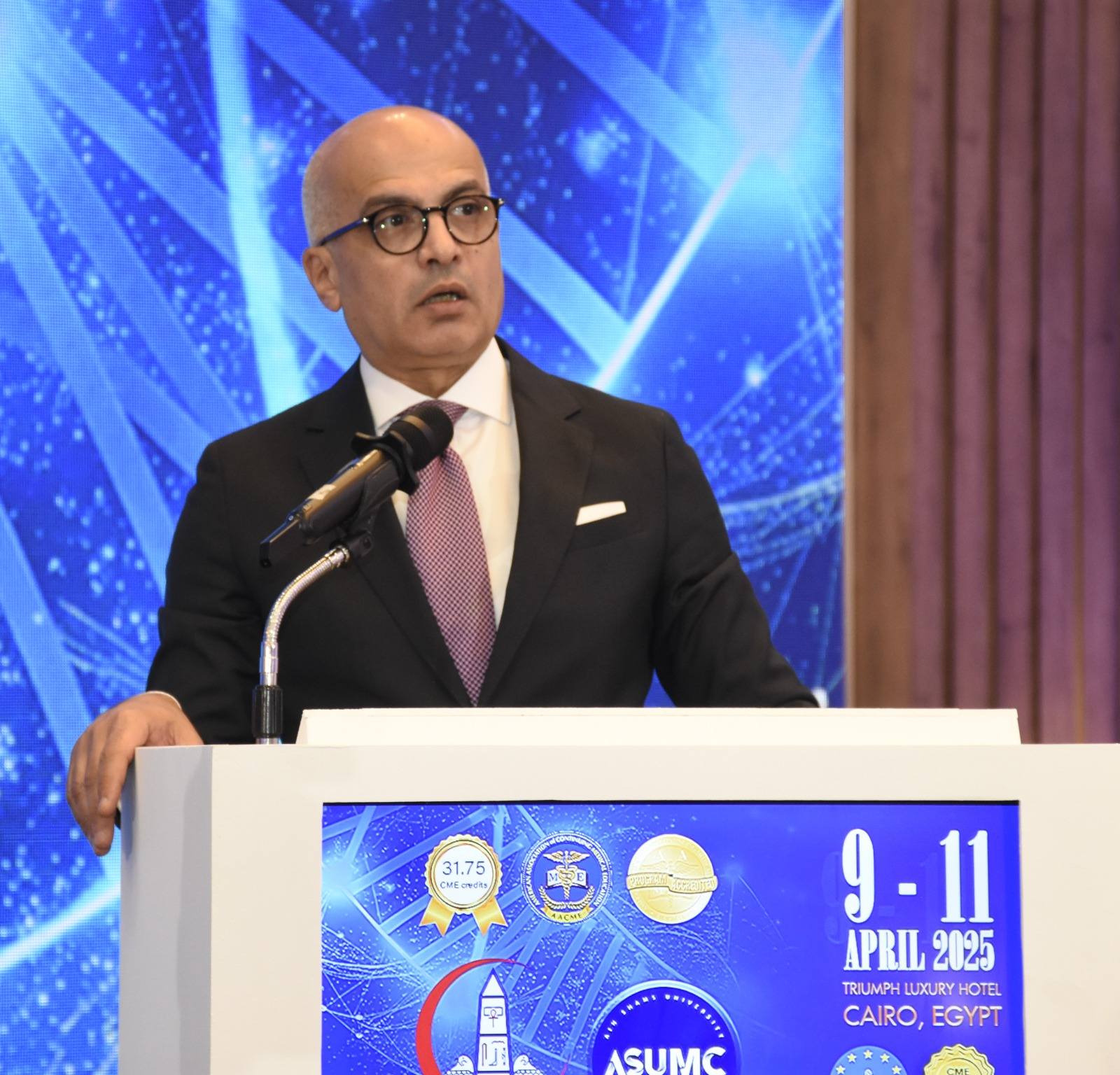 |
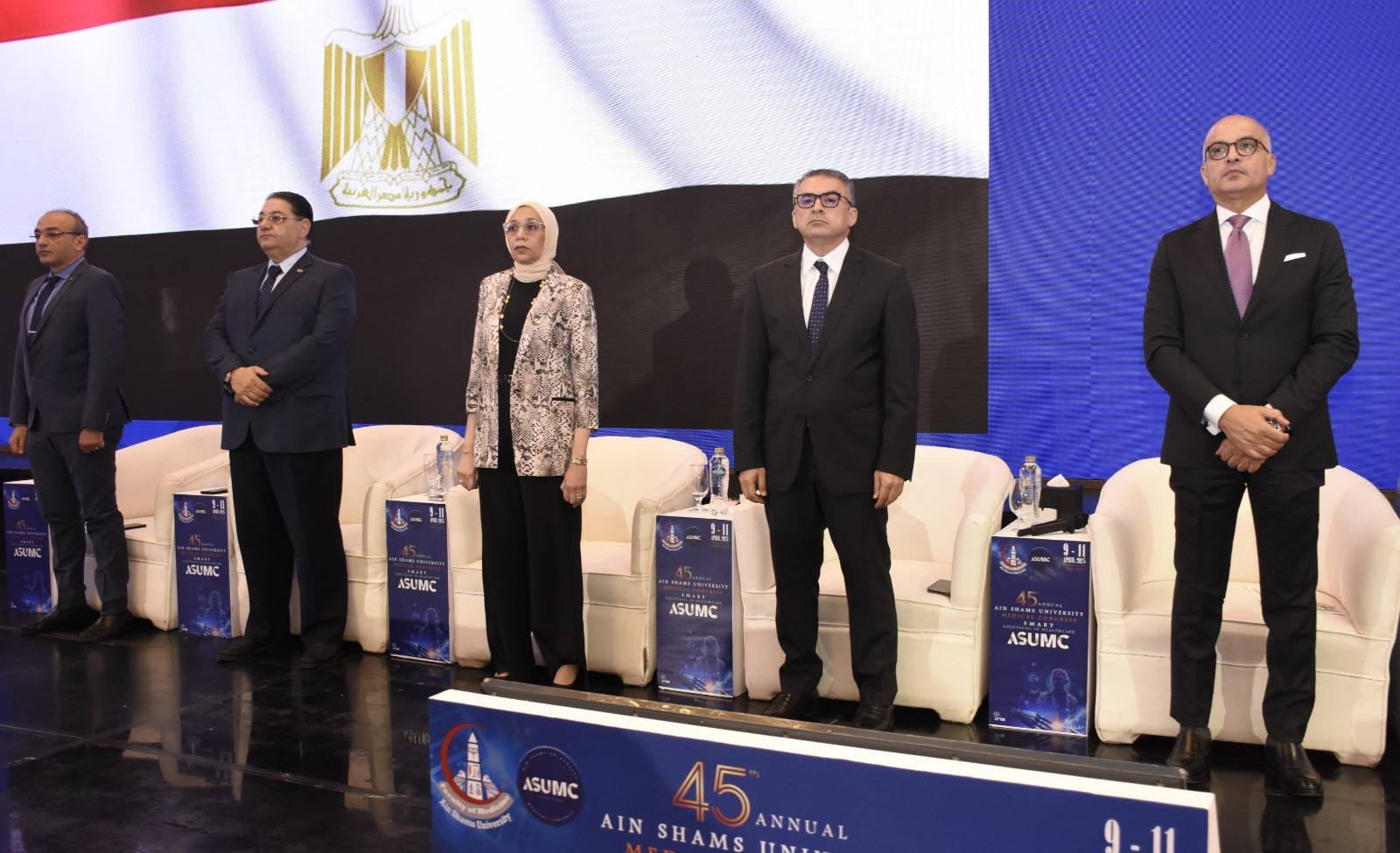 |
||
Prof. Awad Tag El-Din, Advisor to the President of the Republic for Health and Prevention Affairs, expressed his pride and happiness with the remarkable progress witnessed by the conference year after year. He emphasized that what we see today is an extension of Ain Shams University's distinguished journey and a product of the strong history of the Faculty of Medicine, one of the most prestigious medical institutions in Egypt and the Arab world.
He pointed out that the Faculty of Medicine at Ain Shams University boasts scientists and researchers from around the world, adding that Egyptian doctors, particularly in the field of diagnostic radiology, were among the first to introduce artificial intelligence applications to the medical field in Egypt.
Despite praising the role of artificial intelligence in improving medical performance, Prof. Awad Tag El-Din emphasized that there are areas where these technologies cannot fully replace the human element, most notably healthcare and treatment, due to the human interaction and medical sensitivity they require that cannot be programmed.
Noting that Ain Shams University was one of the first institutions to embrace this technology and integrate it into medical education and practice,
Prof. Awad Tag El-Din also addressed the French President's praise, during his visit to Egypt, for the distinguished academic relations between Egyptian and French universities, particularly in the medical field. He noted the extent of cooperation in degrees and scientific exchange, and commended Egypt's distinguished human resources and advanced capabilities in the healthcare sector.
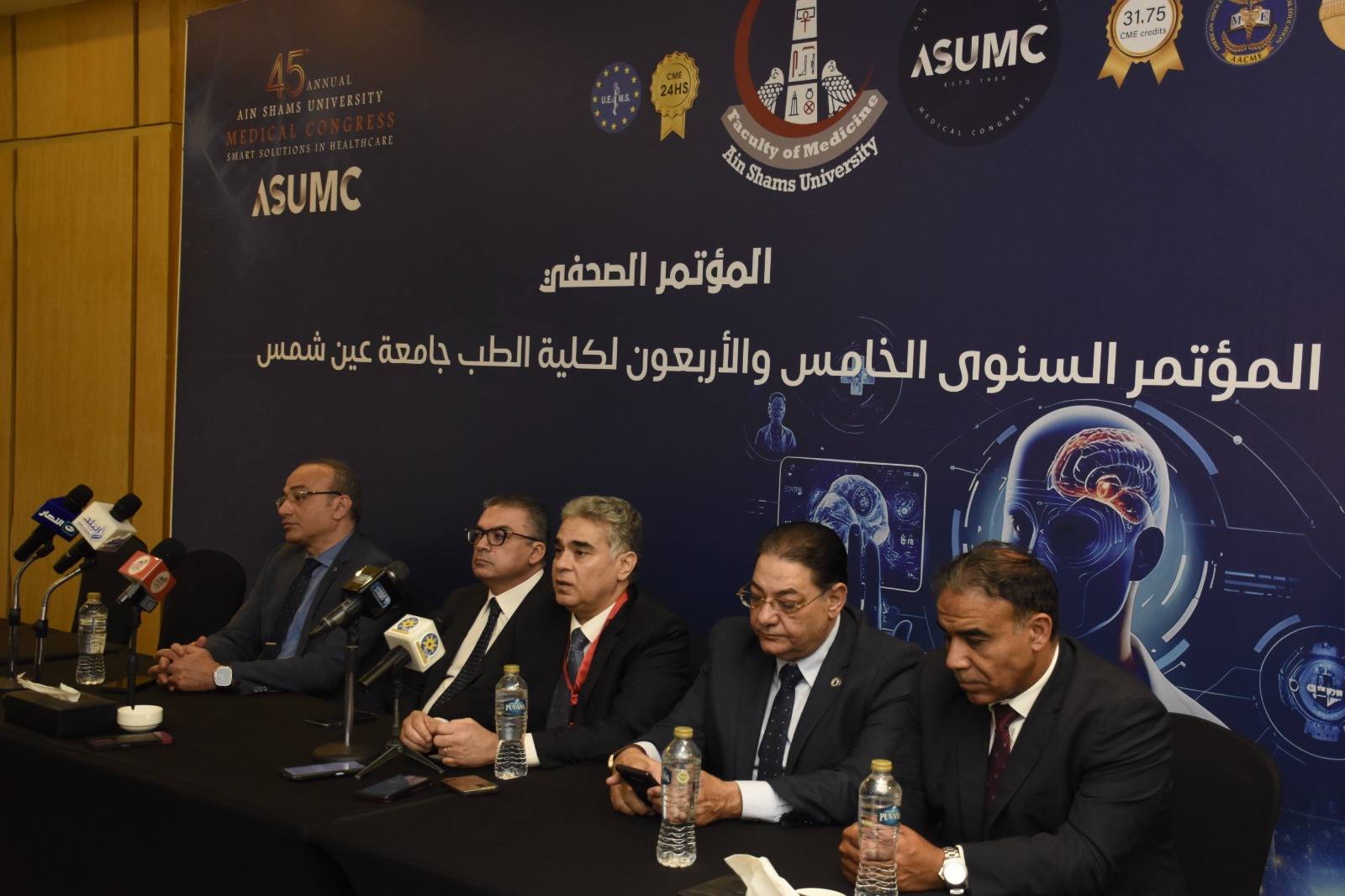 |
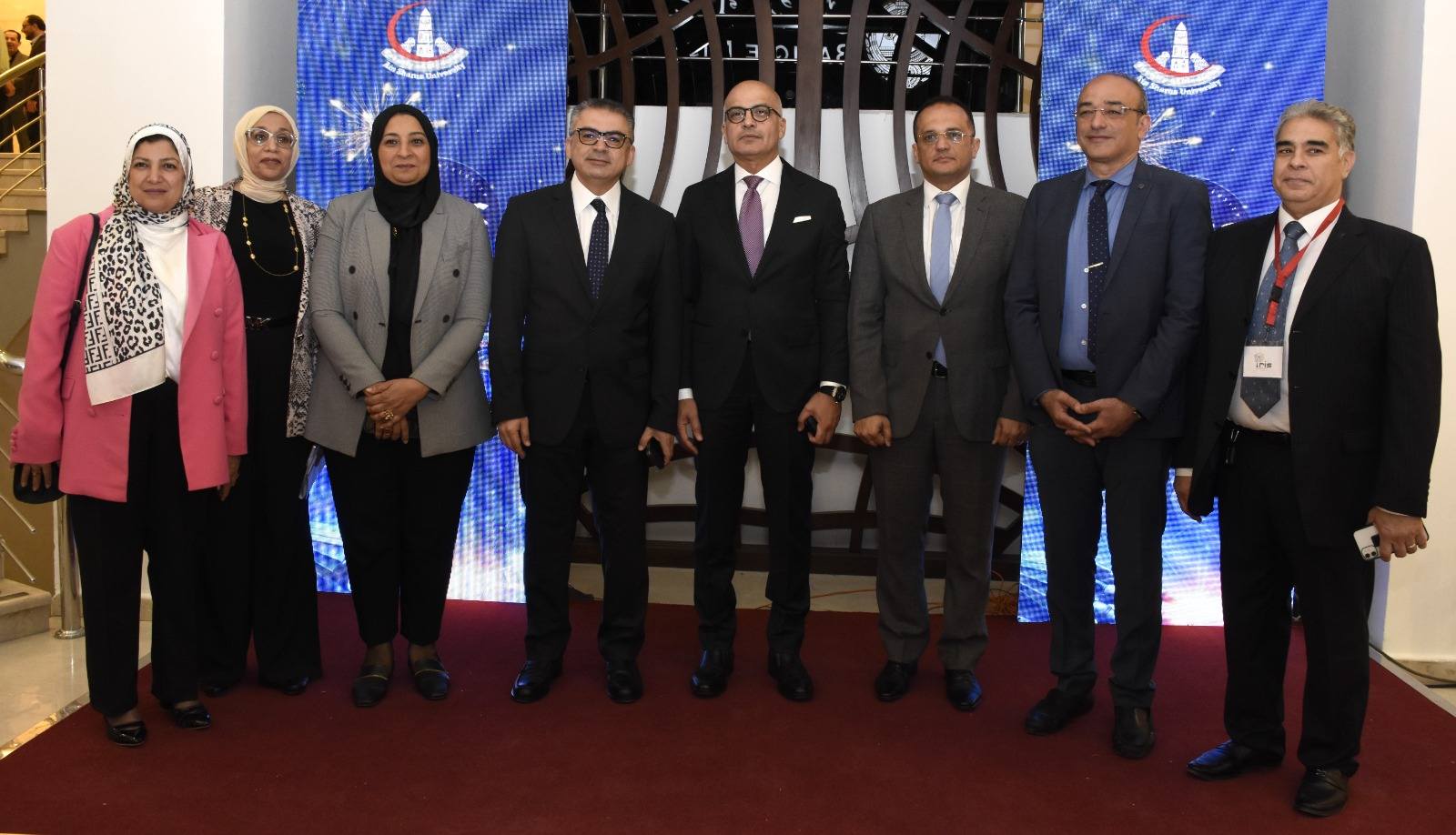 |
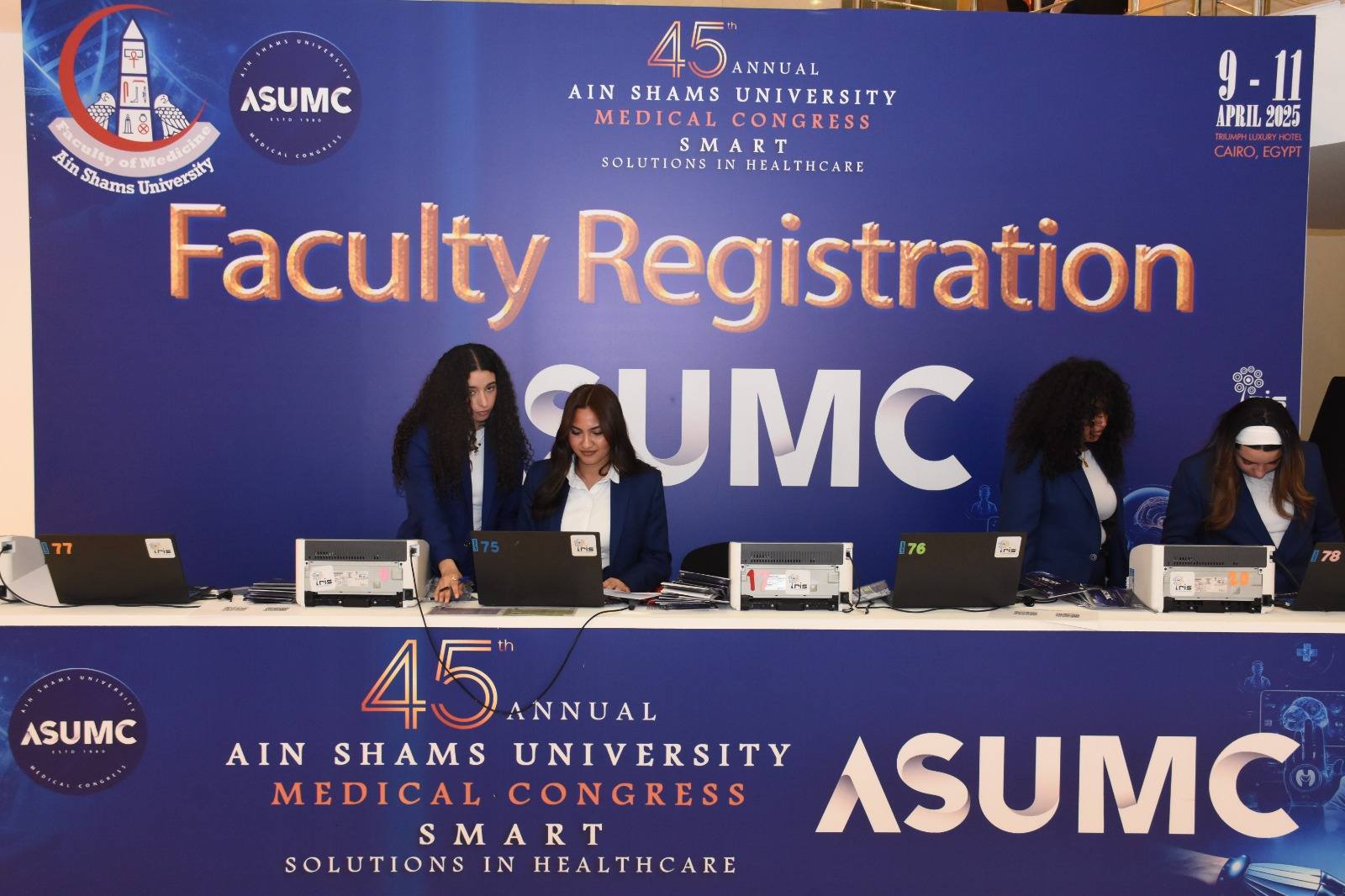 |
||
During his speech at the conference, Prof. Mohamed Diaa emphasized that the strength of faculties is not measured solely by their date of establishment, but rather by their ability to exert a real scientific and societal impact. He pointed out that the Faculty of Medicine at Ain Shams University embodies this influence through its academic presence, its constant keeping pace with global medical developments, and its commitment to integrating modern technologies, most notably artificial intelligence, into the education and healthcare system.
Prof. Mohamed Diaa explained that artificial intelligence will not eliminate the role of the human element but rather comes within the framework of supporting and assisting physicians. He emphasized that medical decisions would remain based on human experience and clinical intuition, which cannot be replaced by technology or algorithms, no matter how accurate.
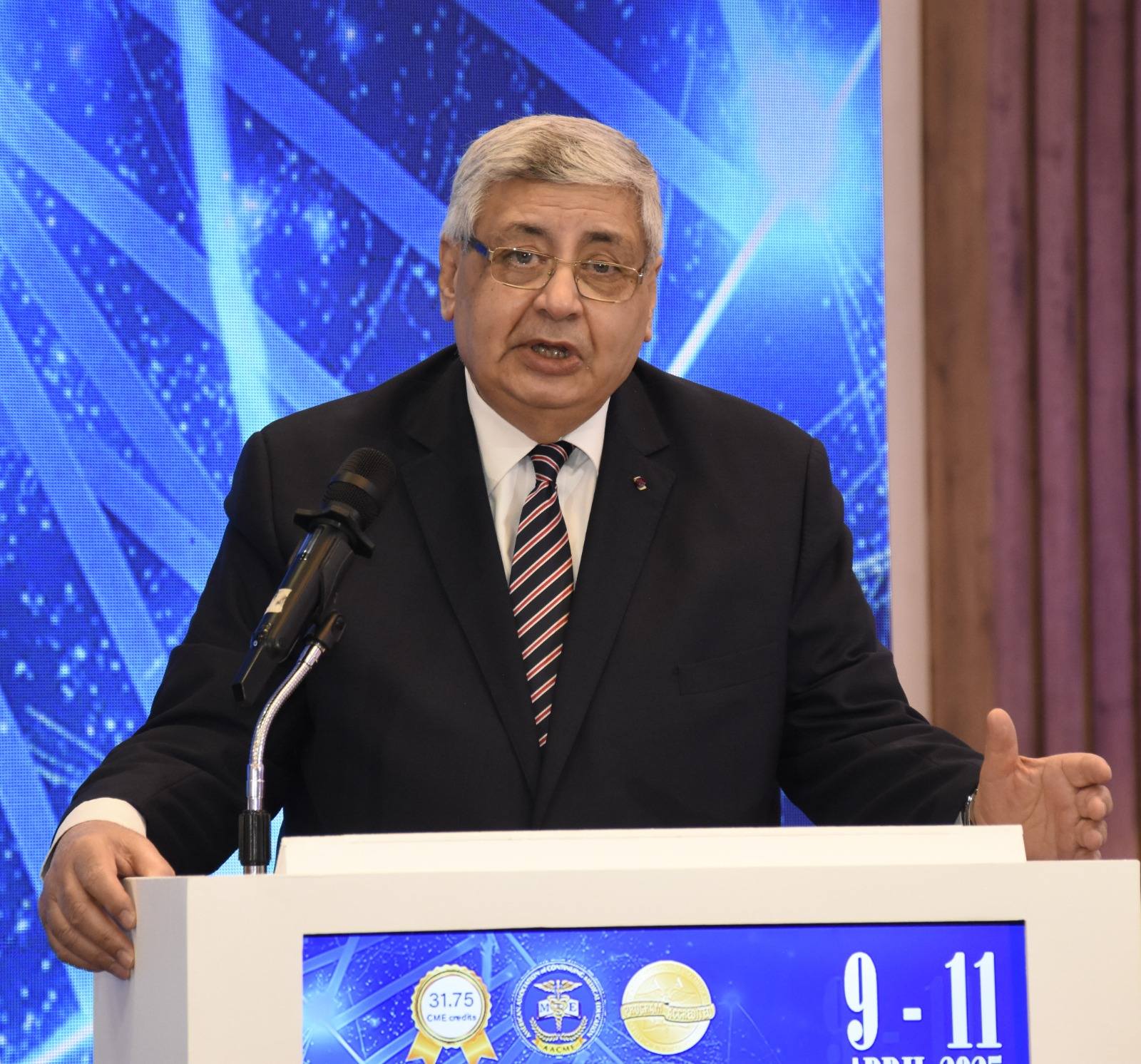 |
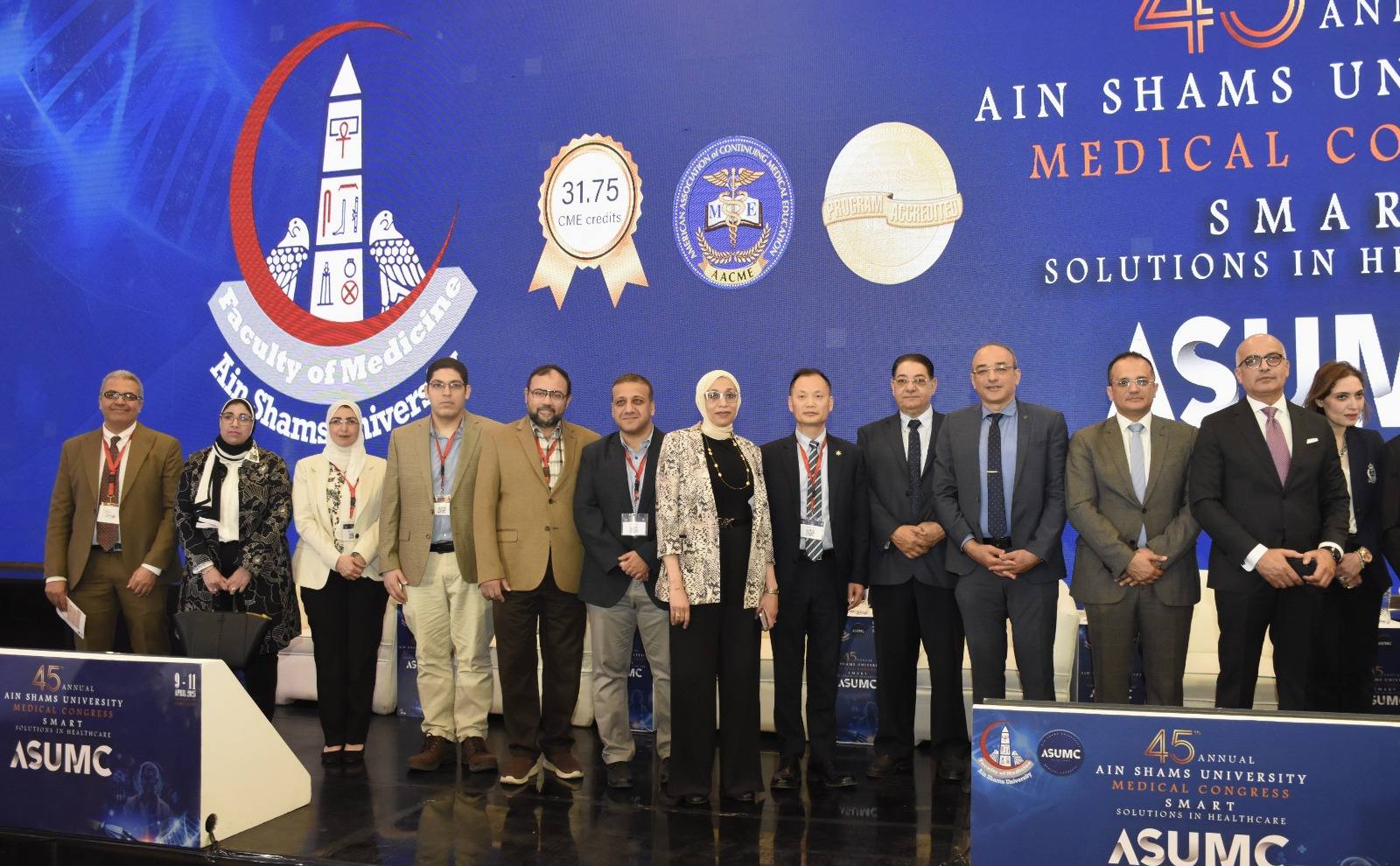 |
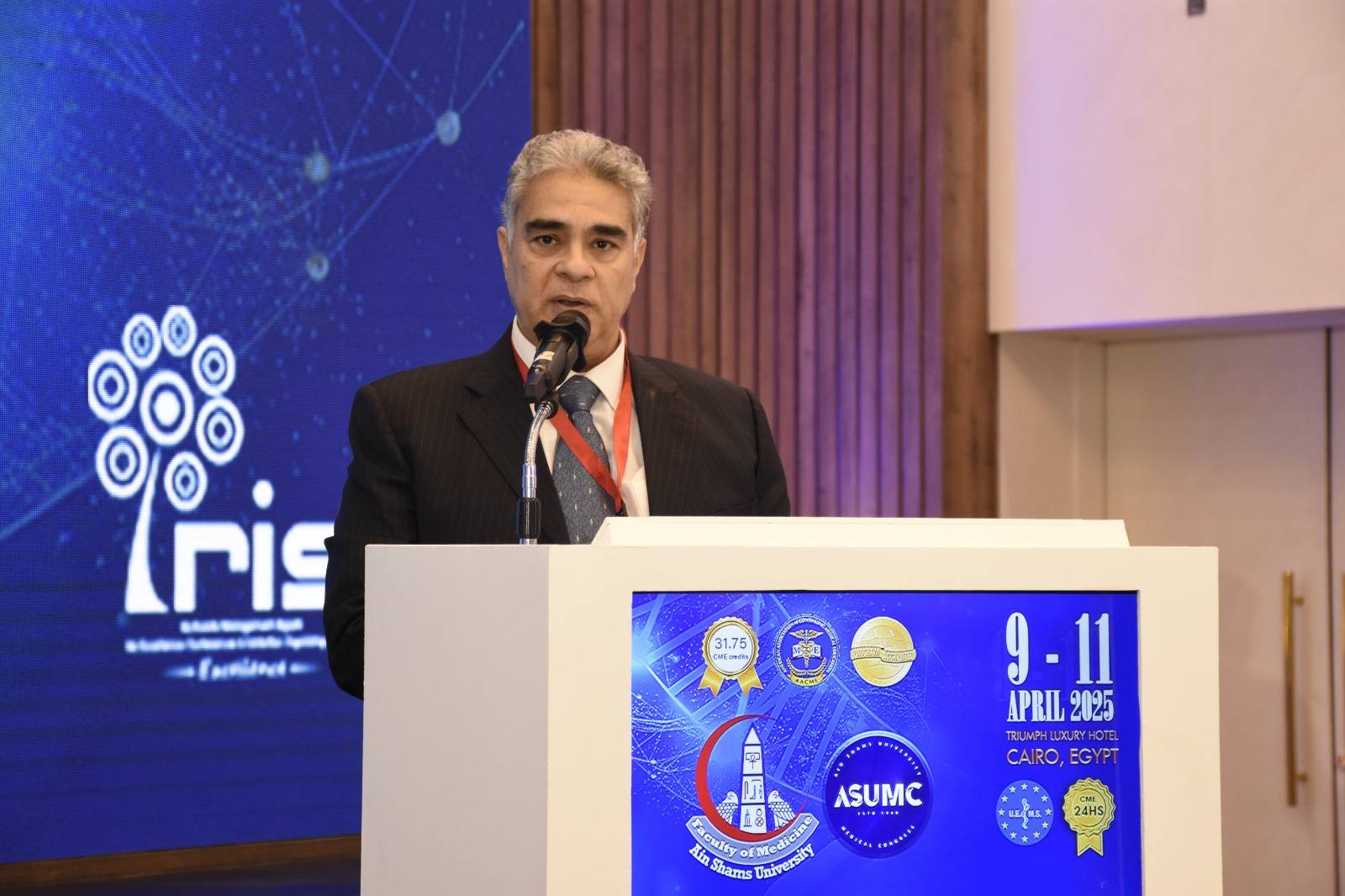 |
||
He emphasized that the physician will always remain at the heart of the medical process, leading it with their knowledge and enriching it with their humanity, leveraging artificial intelligence tools to provide more accurate and efficient service to patients.
He pointed out that this year's conference theme, "Smart Solutions in Medical Practice," is not merely an academic title, but rather an expression of an integrated human and scientific vision for a future driven by artificial intelligence, supported by enlightened minds and alert consciences. He added, "We have entered a new era in which smart machines lead the hands of humans, not to replace them, but to enhance their capabilities and open up unprecedented horizons. Artificial intelligence is no longer a dream; it has become an effective partner in diagnosis, treatment, and the management of health systems, and even in the education of our medical students."
His Excellency emphasized that this technological breakthrough, no matter how complex, requires a moral and humane compass to guide its course. He emphasized that "the governance of artificial intelligence is no longer a luxury, but an urgent necessity. It ensures that technology remains at the service of humanity, not that humanity becomes a tool in its service."
The university president also explained that Ain Shams University believes that its mission does not stop at producing knowledge but extends to directing and employing it responsibly. Therefore, the university is working to integrate the principles of artificial intelligence ethics into the academic curriculum, to prepare a generation of leaders capable of employing these tools efficiently and conscientiously.
The university president concluded his speech by saying, "This conference is not merely a scientific meeting; it is a meeting of hearts and minds, where we pose the big questions and reflect on the future of our noble profession, which, despite all developments, will remain an act of mercy and a message of conscience."
Prof. Ali Al-Anwar, Dean of the Faculty of Medicine, Ain Shams University, Chairman of the Board of Directors of University Hospitals, and Conference Chair, expressed his sincere thanks and appreciation to Prof. Awad Tag El-Din, Advisor to the President of the Republic, and Prof. Mohamed Diaa Zain El-Abedeen, for their continued support and constant commitment to the Faculty of Medicine and its academic progress.
He also explained that the choice of the conference title, "Smart Solutions in Medical Practice," reflects the digital transformation that has already begun in university faculties and hospitals. He emphasized that new educational curricula have been implemented for students, integrating the use of artificial intelligence technologies in the medical field.
He pointed to the faculty’s pioneering experience in managing artificial intelligence in the field of diagnostic radiology. Doctors are trained to use medical image analysis techniques using smart tools, without the goal of replacing the physician, but rather empowering them with more advanced and accurate tools.
In his speech, he emphasized the importance of encouraging Faculty students and researchers to present innovative projects in the field of artificial intelligence, without fear of diminishing their professional role. He emphasized that these technologies are not a substitute for the human element, but rather advanced tools that operate under the guidance and expertise of doctors, helping to improve performance and the quality of healthcare services provided.
Prof. Al-Zaher Hassan Al-Zaher, conference secretary, emphasized that the conference places special emphasis on developing the skills of health and education professionals through ongoing training programs that contribute to building professional capabilities that keep pace with the rapid changes in the healthcare work environment.
Among the conference's core objectives is raising community awareness of the ethical issues arising from scientific and technological progress by presenting them for public discussion and simplifying them in an understandable language that allows for broader participation from various groups. The conference also seeks to build a broad network of specialists and researchers to exchange knowledge and expertise, opening new horizons for cooperation and integration in this vital field.
He added that the conference program included multiple activities, most notably organizing workshops and training courses for professionals and students, in addition to developing and updating curricula related to bioethics.
The program also included the publication of specialized scientific research, scientific meetings and conferences to present ideas and exchange experiences and establishing effective partnerships with international institutions and local entities working in the same field.
He stated that the conference, held over three days, included 105 scientific sessions with the participation of approximately 700 faculty staff from various Egyptian and Arab universities, and 39 foreign researchers and lecturers. Over the three days, 24 workshops were held with the participation of all faculty departments. The conference is accredited by the American Association for Continuing Medical Education and the European Association for Continuing Medical Education.


.svg)

